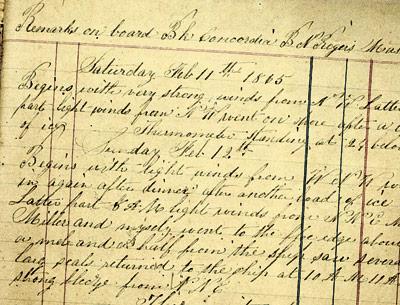Hearing Voices From the Past

The East Hampton Historical Society’s 2014 winter lecture series begins tomorrow night with a reading of Capt. William King’s log of the whaling barque Concordia.
“In their Own Words: Voices From East Hampton’s Past” is a four-part program in which actors will read ships’ logs, diaries, and other records, along with additional performances and narration. All events will be held on the last Friday of the month and begin at 7 p.m., and free refreshments will be served before the lecture.
“The idea for this whole series was to refrain from the way we normally do them — a traditional lecture where someone has done research and presents it to the community,” said Richard Barons, the society’s executive director, on Tuesday. “We thought it was high time that the people we were talking about do the talking. We chose them because they had left us a written record.”
“Frozen in Hudson’s Bay: William King’s Log of the Whaling Barque Concordia” will feature Ken Collum, a village code enforcement officer and fire marshal, reading Mr. King’s log, and Mr. Barons, who will narrate.
The log reads like a diary, Mr. Barons said, and illustrates a time in the history of whaling in which “the market really is for the whalebone, for corset-making in New England.” He promised a fascinating look into the period and the Concordia crew’s experience in the frozen Hudson’s Bay.
The series will continue on Feb. 28 with “The Rustic Manners of Old East Hampton: John Howard Payne’s 1838 Recollections of his Boyhood.” Josh Gladstone will read Payne’s travelogue about the village, and a scene from “Clari, or the Maid of Milan,” in which the song “Home, Sweet Home” was first sung, will be performed. “Payne’s 1838 recollections of visiting his aunt in East Hampton are extremely rich,” said Mr. Barons.
On March 28, the society will present “An Eagle Eye on East Hampton’s Main Street: Cornelia Huntington’s Vivid Diary 1820-1860.” Barbara Borsack, a member of the village board, will read from the diary of Miss Huntington, who lived in East Hampton circa 1801 to 1870.
The diarist, the author of the novel “Sea Spray,” kept a diary throughout most of her life, Hugh King, the village’s historic site manager and the town crier, told the village board earlier this month. “That diary is a window into what it was like to live here in East Hampton.”
“Just as in her novel,” said Mr. Barons, “she really does bring out a lot of things — the community, socializing, servants, summer people. She mentions in the late 1840s that ‘all the houses are filled this summer, there is no more room.’ People often think it wasn’t until the train came that this area became a very popular summer resort.”
The series will conclude on April 25 with “From Cradle to Grave: The Rev. Nathaniel Huntting’s Extraordinary Records of East Hampton, 1696-1753.” Evan Thomas will read from the records and Mr. King will narrate.
“We often forget that in the 17th and 18th centuries, the minister was in charge of keeping records of births, deaths, marriages. There was no clerk paid by the village.” The Rev. Huntting, said Mr. Barons, “takes it seriously enough that it is somewhat like [Mr. King’s log]. He gives us so much more information. We find out about this tidal wave of influenza, when a great number of people die.”
Mr. Barons predicted an engaging series. “You’ll be hearing their words,” he said of the four writers. “That’s why we’ve chosen people to play that role, rather than me saying, ‘Let me read this to you.’ I think that will bring it alive.”
